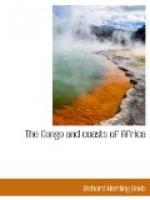After Calabar, at each port off which we anchored, at Ponny, Focardos, Lagos, Accra, Cape Coast Castle, and Sekonni, it was always the same. Always there came over the side the man going “Home,” the man who had fought with the Coast and won. He was as excited, as jubilant as a prisoner sentenced to death who had escaped his executioners. And always the heartiest in their congratulations were the men who were left behind, his brother officers, or his fellow traders, the men of the Sun Hat Brigade, in their unofficial uniforms, in shirtwaists, broad belts from which dangled keys and a whistle, beautifully polished tan boots, and with a wand-like whip or stick of elephant hide. They swarmed the decks and overwhelmed the escaping refugee with good wishes. He had cheated their common enemy. By merely keeping alive he had achieved a glorious victory. In their eyes he had performed a feat of endurance like swimming the English Channel. They crowded to congratulate him as people at the pit-mouth congratulate the entombed miner, who, after many days of breathing noisome gases, drinks the pure air. Even the black boys seem to feel the triumph of the white master, and their paddles never flashed so bravely, and their songs never rang so wildly, as when they were racing him away from the brooding Coast with its poisonous vapors toward the big white ship that meant health and home.
Although most of the ports we saw only from across a mile or two of breakers, they always sent us something of interest. Sometimes all the male passengers came on board drunk. With the miners of the Gold Coast and the “Palm Oil Ruffians” it used to be a matter of etiquette not to leave the Coast in any other condition. Not so to celebrate your escape seemed ungenerous and ungrateful. At Sekondi one of the miners from Ashanti was so completely drunk, that he was swung over the side, tied up like a plum-pudding, in a bag.
When he emerged from the bag his expression of polite inquiry was one with which all could sympathize. To lose consciousness on the veranda of a cafe, and awake with a bump on the deck of a steamer many miles at sea, must strengthen one’s belief in magic carpets.
Another entertainment for the white passengers was when the boat boys fought for the black passengers as they were lowered in the mammy-chair. As a rule, in the boats from shore, there were twelve boys to paddle and three or four extra men to handle and unhook the mammy-chair and the luggage. While the boys with the paddles manoeuvred to bring their boat next to the ship’s side, the extra boys tried to pull their rivals overboard, dragging their hands from ropes and gunwales, and beating them with paddles. They did this while every second the boat under them was spinning in the air or diving ten feet into the hollow of the waves, and trying to smash itself and every other boat into driftwood. From the deck the second officer would swing a mammy-chair




